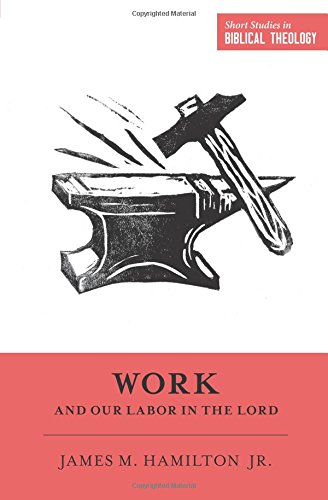A Brief Book Summary from Books At a Glance
by Andrew J. Spencer
In the past decades there has been a resurgence of interest in the integration of faith and work. This has led to a large number of volumes on the doctrine of work from evangelical outlets. Sometimes these new books have a different author, but offer very little that is new to the conversation. Jim Hamilton’s recent book, Work and Our Labor in the Lord, is refreshing departure from that trend.
Hamilton is a professor of biblical theology at the Southern Baptist Theological Seminary and a preaching pastor at Kenwood Baptist Church. He has the knowledge, disposition, and skill to read the biblical narrative and identify consistent, unified themes from the whole counsel of God. His experience as a pastor helps him to take those themes and make them applicable to a wide audience.
This volume is a recent entry in a Crossway series, Short Studies in Biblical Theology. Each of the volumes looks at a different thread that is found interwoven throughout the canon. This text, following the common pattern of biblical theology, consists of four chapters that have the headings creation, fall, redemption, and restoration in addition to a separate introduction and conclusion.
In Chapter One, Hamilton outlines the state of work before Adam’s sin. Work was inherently good and was part of God’s design for humanity from the very beginning. Adam and Eve were given the duty of tending the Garden of Eden. Work was intended to be a form of worship and reflection of God’s image in this world.
The second chapter outlines the negative effects of sin on the nature of work. God cursed the work of both Adam and Eve; it became painful and difficult. Still, humans were still intended to honor God by being obedient to make a living by cultivating the land. Humanity continues to corrupt the goodness of work and turn it toward different ends than God designed it, but Hamilton points out that there is still hope within work after the fall. God continues to work through human vocation for his own glory despite pervasive sinfulness. Though unworthy of the calling, people are still given opportunity to fulfill the mandate of Adam and Eve to worship through work. Hamilton illustrates this by walking through a number of Old Testament passages that illustrate the doctrine of work and its value in a fallen world. . . .
[To continue reading this summary, please see below....]The remainder of this article is premium content. Become a member to continue reading.
Already have an account? Sign In
